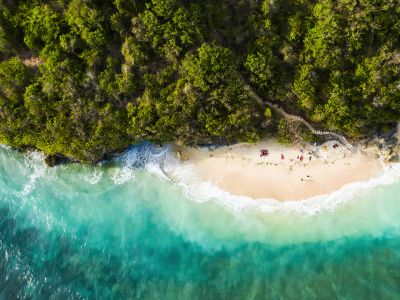*YMT Vacations is a member of the Travelopia group of travel companies which has come together to partner with Blue Marine Foundation

YMT Sustainability Plan
At YMT Vacations, we are driven by travel’s potential for good. We believe in making a positive impact on the places we see and the people we interact with, through inspiring travel experiences.
We are conscious of the climate crisis, and we acknowledge that some aspects of tourism can be carbon intensive. Together with our valued suppliers and partners, we are committed to playing our part in reducing our footprint in line with the Intergovernmental Panel on Climate Change’s (IPCC) global goals. We are also working on our decarbonizing strategy, and we aim to cut down emissions and add more value to our tours by empowering local communities.
Meaningful Partnerships
YMT Vacations is a proud member of Tourism Cares, a non-profit organization dedicated to making a positive difference through travel and tourism. Together, we’re part of a growing movement to create a more sustainable, inclusive, and responsible future for travel.

Meaningful Travel
Through our partnership with Tourism Cares, YMT is connected to the Meaningful Travel Map, an interactive guide that highlights authentic, sustainable experiences around the world. The map showcases community-led tours, eco-conscious accommodations, and locally driven initiatives that protect cultures, preserve nature, and empower the people who call these destinations home.
What This Means for YMT Guests
For YMT travelers, meaningful travel goes beyond sightseeing—it’s about connecting with places and people in ways that leave a lasting impact. Every journey becomes a story of shared value, whether it’s uplifting communities, caring for the planet, or deepening your own travel experience with genuine purpose and connection.
At YMT, we’re proud that many of our itineraries feature experiences found on the Meaningful Travel Map—opportunities that allow guests to engage with local traditions, artisans, and environments in a positive, sustainable way. And we’re not stopping there. We’ll continue expanding these purpose-driven experiences so that every YMT vacation contributes to a brighter future for travel and the world we explore together.
Taking climate action by supporting healthy oceans
As part of our commitment to climate and nature action, we’ve joined our sister companies across the Travelopia Group* to partner with Blue Marine Foundation.
Our objective is to help conserve the stunning coastlines and marine life that enrich your vacations and restore ocean ecosystems that are vital in tackling climate change.
Together with our sister travel companies, we aim to fund and support the conservation and restoration of 7,000 hectares of vital marine ecosystems through seven global projects.

From the Mediterranean to the Caribbean, Kenya to Indonesia, these protected “blue carbon ecosystems” have the potential to remove and store thousands of tonnes of carbon every year. They will also help protect a rich diversity of coastal and underwater wildlife, including endangered species.
Our support will also enable the training and employment of local communities in marine conservation, helping ensure these beautiful places are preserved for generations.
Impact So Far
Through a combination of conservation, ecosystem restoration, research and community engagement, each project seeks to address the climate and biodiversity crisis in different ways, empowering and engaging local communities.
So far, 30 hectares of blue carbon habitat have been restored, 12,500 mangrove trees have been planted, 113 community members have been upskilled and engaged in marine restoration, and there have been sightings of rare and endangered wildlife in a couple of the project areas. Here’s a quick overview of the impact our projects have had so far:
GREECE A blue carbon approach to saving Greek seas: we’ve identified 167 marine species off Corfu, and 15 of them are protected. Plus, we’ve mapped five distinct marine habitats and over 621,000 square meters of seagrass meadows.
Latest Update: We’ve also conducted research to better understand the carbon removal and storage potential of Posidonia seagrass. It has been estimated that the carbon storage potential of local Posidonia seagrass is three times higher than initially gauged. Plus,a rare sighting of an endangered Mediterranean Monk Seal is registered and this will help support protection proposals for the area.
FORMENTERA Safeguarding the future of ancient seagrass meadows: a seagrass restoration plan has been developed and a pioneering trial is currently underway to plant 300 seagrass seedlings on rocky surfaces.
Latest Update: About 4,650 Posidonia plants have been planted on rocky substrate and we’ve noticed strong seedling survival rates, which is a positive sign.
KENYA Restoring Mida-Creek’s mangrove forests: we’ve planted about 12,000 mangroves in Mida Creek.
Latest Update: Around 1.3 hectares of mangrove forests have been restored in Mida Creek, with the help of local community members. A ‘Not Yet Identified’ crab species was discovered at one of the planting sites.
THE CARIBBEAN Restoring blue carbon habitats and protecting unique marine ecosystems: work on mangrove channel restoration is in progress, and we’re also propagating a ‘native plant nursery’ of mangrove species.
Latest Update: About 1,200 red and black mangroves have been planted in collaboration with over 50 community volunteers. In addition, weekly volunteer sessions engaged local communities in preparing mangrove restoration channels. The mangrove channel maintenance has helped improve tidal flow and keep key waterways open.
INDONESIA Community-led restoration of Indonesia’s extraordinary blue forests: about 27 hectares have been earmarked for habitat restoration, and 45 community leaders have been trained in mangrove restoration.
Latest Update: About 25 hectares are under ecological restoration and 45 local community members have been trained in restoring mangroves.
PHILIPPINES Restoring abandoned aquaculture ponds to productive mangrove forests: 8,000 mangrove saplings have been planted this spring.
Latest Update: A new mangrove nursery has been created, and an agreement has been signed with the local government in support of the project. About 25,000 mangrove saplings have been planted, and 68 members of the local community have been engaged in activities.
THE MALDIVES Restoring mangroves and seagrass for climate mitigation and resilience: research on critical mangrove loss is underway, and we will be assisting development of national restoration projects.
Latest Update: Critical mangrove loss research has been completed to assist development of national restoration projects. Plus, a seagrass education module has been developed for schools and resorts. Around 22 resorts participated in an ocean habitat protection workshop.
Sustainability Tips for Travelers
As a responsible traveler, here are a few simple tips that you could follow to help preserve the amazing destinations you visit, either with us or independently.
Remember you are a guest in the destination, so be mindful of the environment and the local culture. Small steps such as reducing single-use plastics and carrying your own water bottle, go a long way towards creating a better future for our planet.

Reduce
Minimize single-use items, disposable wipes, paper, and plastic waste when you can.
Bring a refillable water bottle, travel cups, and stainless-steel straws with you while traveling. You can check apps such as Water-Map for information on free water refills.
Pack a re-usable fabric bag for souvenir shopping.
Keep tickets and travel documentation saved digitally on your mobile device.
Turn lights and electronics off when not needed, and take shorter showers.
Follow the same practices you do at home by reusing bath towels and sheets in lodging spaces.
When you’re in an area with poor mobile coverage, put your phone in airplane mode (or turn it off). The battery of your phone lasts longer, which reduces the need for charging, and hence, saves energy!
Respect
Sustainable travel is about treating the planet and its residents with respect. Whether you want to support a local business or donate to a cause close to your heart, here are a few tips.
When traveling to conservative destinations, research and dress appropriately to respect local sentiments.
Stay on official footpaths for your own safety and to decrease trampling and disturbance of local wildlife.
“Leave no trace” by taking litter with you and recycling plastic waste in receptacles.
Refrain from touching coral reefs or stepping on marine life when snorkeling, as this interferes with the natural regeneration of the sea bed.
Use eco-friendly sunscreen since certain substances are toxic to coral and fish. Mineral-based creams consisting of zinc or titanium oxide are kinder to the environment.
Say no to souvenirs made from animal parts such as ivory, tortoiseshell, or reptile skins.
In areas where wildlife is at risk, reduce noise and light pollution as it may cause distress to certain species.